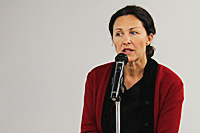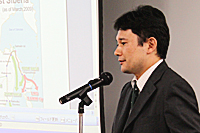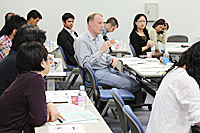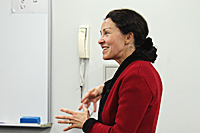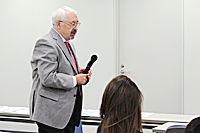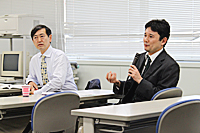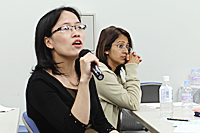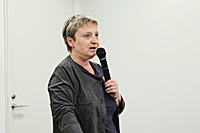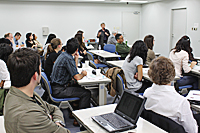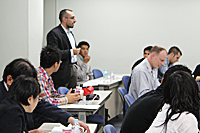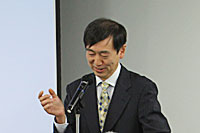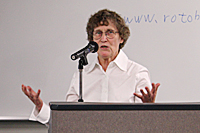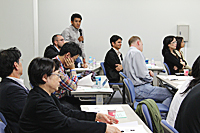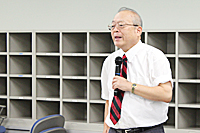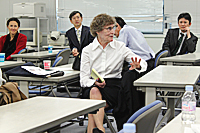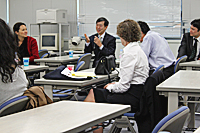政治統合とアイデンティティ
研究:セミナー・ワークショップ
政治領域研究会“Russia's Evolving Relations with East Asia ”
2009.10.14
開催概要
場所:早稲田大学 19号館 710教室
司会:赤羽恒雄 (モントレー国際大学国際政策学大学院教授 東アジア研究セ
ンター所長、早稲田大学アジア太平洋研究センター客員教授)
言語:英語(通訳なし)
入場無料
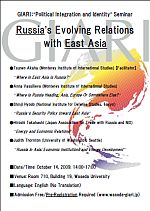 Poster[104KB]
Poster[104KB]Schedule:
Russia's Evolving Relations with East Asia
Room710, Bulding NO.19 Waseda University
2:00-5:00 pm, October 14, 2009
2:00-2:10 pm
Introduction
2:10-2:30 pm
Tsuneo Akaha (Monterey Institute of International Studies)[Facilitator]
"Where in East Asia Is Russia?"
2:30-2:50 pm
Anna Vassilieva (Monterey Institute of International Studies)
"Where Is Russia Heading, Asia, Europe, Or Somewhere Else?"
2:50-3:10 pm
Shinji Hyodo (National Institute for Defense Studies, Tokyo)
"Russia's Security Policy toward East Asia"
3:10-3:40 pm
Discussion
3:40-4:00 pm
Coffee Break
4:00-4:20 pm
Hiroshi Takahashi (Japan Association for Trade with Russia and NIS, Tokyo)
"New Development of Japan-Russia Economic Relations"
4:20-4:40 pm
Judith Thornton (University of Washington, Seattle)
"Russia in Asia; Economic Institutions and Energy Development"
4:40-5:00 pm
Discussion
Summary
- Organizer: GIARI Political Integration and Identity Seminar
- Title: Russia`s Evolving Relations with East Asia
- Presenters and Discussants:
- Tsuneo AKAHA (Monterey Institute of International Studies / GIARI Senior Fellow)
- Anna VASSILIEVA (Monterey Institute of International Studies)
- Shinji HYODO (National Institute for Defense Studies)
- Hiroshi TAKAHASHI (Japan Association for Trade with Russia and NIS)
- Judith THORNTON (University of Washington)
- Date: October 14th, 2009
- Location: Room 710, Building 19, Waseda University
- Participants: In total about 50 participants including
- Yulia MIKHAILOVA (Hiroshima City University)
- Evgenii KOVIRGIN (Seinan Gakuin University)
- Nobuo ARAI (Hokkaido University)
- Takehiko YAMAMOTO (Waseda University)
Opening Remarks:
Professor AKAHA welcomes the audience, introduces the presenting scholars and gives an overview of the proceedings. The research to be presented is part of an ongoing book project about Russia in East Asia.
Presentation 1: ‘Where in East Asia is Russia?’
Tsuneo AKAHA outlines Russia`s relations with East Asia in several dimensions such as politics, economics, military, social-cultural, and its role in East Asian regionalism. He highlights the geographic proximity of Asian markets, investment capital, technology and labor which favor an increasing role for Russia`s Far East in East Asia. At the same time, the combination of center-periphery disparities, huge needs for the improvement of infrastructure, and a small and declining population in Russia`s Far East limits Russia’s role in East Asia. As Russia`s economic strength in the region is weak, he sees the biggest potential in the development of energy resources such as oil and natural gas for the export to East Asia.
Presentation 2: ‘Where is Russia Heading, Asia, Europe or Somewhere Else?’
At the beginning, Anna VASSILIEVA reminds the audience that today`s Russia is a very young state, and that the human factor expressed in cultural and civilizational ties must not be neglected when studying Russian foreign politics. She gives an account of New Russia`s phases of development and argues that the country remains in a stage of identity crisis because the rapid change and turmoil of the 1990s, economic hardships in particular, prevented its people from developing a new set of human values, as well as a sense of belonging and national purpose -- in the twilight zone of national identity formation. As such, Russians often feel misunderstood by the West and are on the continuing search for partnerships in international affairs.
Presentation 3: ‘Russia`s Security Policy Toward East Asia’
Presenter Shinji HYODO, speaking in his private capacity, explains recent developments in Russia`s security policies based on the national strategy released in 2009. He highlights that behind the CIS countries and transatlantic relations, East Asia ranks only third (China) and fourth (India, Japan) on Russia`s list of security priorities. He observes that Russia`s maturing security partnership with China seems to approach a ceiling. While Moscow is paying more attention to its borders and the CIS countries, which have the potential to complicate situations in peripheral areas, energy cooperation (including with Japan) has made some progress and may further develop.
Q&A Session
Presentation 4: ‘New Development of Japan-Russia Economic Relations’
Presenter Hiroshi TAKAHASHI looks at the changes in Russian exports to Japan between 2003 and 2009. Most apparent is the declining share of raw materials such as timber and fish whereas hydrocarbons in the form of coal, oil and since April 2009 also natural gas, came to assume dominant positions in Japanese import statistics. He points to the importance of the Russian energy companies Rosneft and Gazprom and their potential business opportunities with Japanese counterparts.
Presentation 5: ‘Russia in Asia; Economic Institutions and Energy Development’
Presenter Judith THORNTON takes a closer look at Russia`s energy politics which are often linked with foreign policy-making. As about a quarter of the Russian state`s tax revenues comes from the energy sector, the ability to exercise political control is significantly dependent on the latter. In this context, she explains how the nationalization of the energy sector has led to the monopolies of Gazprom (natural gas) and Rosneft (oil) in the up- and downstream sectors. The result is a situation with low investment, slow structural change, slow improvement in technical efficiency, implicit domestic subsidies, continued rent-seeking and low growth of Russia`s energy sector, and overall a very inefficient and wasteful institutional setup in the energy sector.
Q&A Session
Closing Remarks by Tsuneo AKAHA
After a second stimulating round of Q&As, Tsuneo AKAHA summarizes the main findings, thanks the presenters as well as the participants, and closes the seminar.
Summary by Christian WIRTH, PhD Candidate GSAPS, Research Assistant GIARI, Waseda University
summary[68KB]写真
![Tsuneo Akaha (Monterey Institute of International Studies)[Facilitator] Tsuneo Akaha (Monterey Institute of International Studies)[Facilitator]](/photoimages/20091014_01.jpg)
